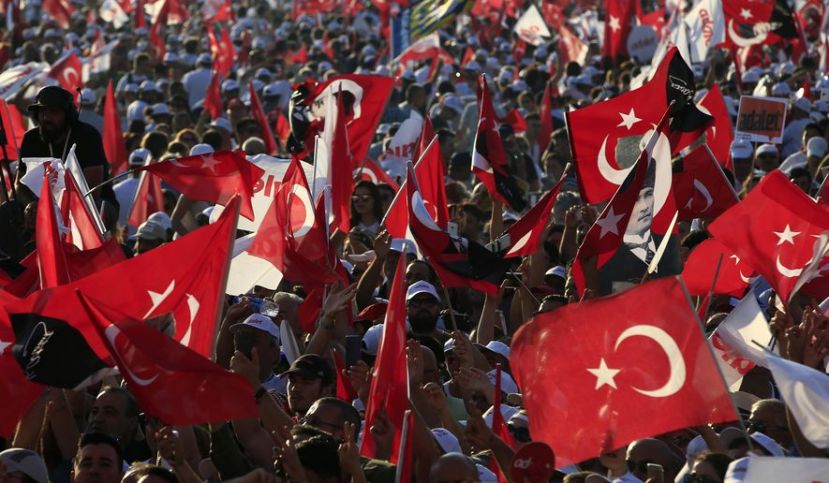Businessman Güzel Wrote for Washington Times: How U.S.-Turkey Relations Grow Stronger
 FILE - In this Sunday, July 9, 2017 file photo, supporters of Kemal Kilicdaroglu, the leader of Turkey's main opposition Republican People's Party, hold Turkish flags in Istanbul, as they gather for a rally following their 425-kilometer (265-mile) 'March for Justice' from capital Ankara to Istanbul. Turkey declared a three-month state of emergency after a failed coup attempt in 2016, and has extended it seven times since then, but it is scheduled to end at midnight Wednesday July 18, 2018, though opposition leaders insists that new anti-terrorism laws are just as oppressive as the emergency powers they will replace. (AP Photo/Lefteris Pitarakis, File)
FILE - In this Sunday, July 9, 2017 file photo, supporters of Kemal Kilicdaroglu, the leader of Turkey's main opposition Republican People's Party, hold Turkish flags in Istanbul, as they gather for a rally following their 425-kilometer (265-mile) 'March for Justice' from capital Ankara to Istanbul. Turkey declared a three-month state of emergency after a failed coup attempt in 2016, and has extended it seven times since then, but it is scheduled to end at midnight Wednesday July 18, 2018, though opposition leaders insists that new anti-terrorism laws are just as oppressive as the emergency powers they will replace. (AP Photo/Lefteris Pitarakis, File)
By Murat Güzel - In the aftermath of the NATO Summit in Brussels, I have reflected on the importance of strong trans-Atlantic bonds and how this critical alliance has paved the way for economic growth which has benefitted both sides of the Atlantic. In an unstable world, we need strong trade alliances like the U.S.-Turkey one. We need a robust NATO as well. This week also marks the tragic anniversary of the darkest chapter in Turkey’s recent history, the July 15 failed coup. I am not a politician or an expert on international relations. I am a first-generation Turkish American who has built a multinational business. I am a “commercial” diplomat.
I immigrated during the presidency of Ronald Reagan. Often, I am reminded of his vision of a “City on a Hill.” My adopted nation has and must always be a beacon of economic freedom, democracy and the center of commerce for the world.
As my birth country mourns those who died on the tragic night two years ago — including personal friends of mine — it gives me solace that both the Turkish economy and the NATO alliance are strong.
Even before making America my home, I studied American history and the wisdom of our Founding Fathers. President Andrew Jackson established diplomatic relations with the Ottoman Empire in 1831. Turkey has been a NATO ally since 1952.
With a strong security alliance, an economic partnership has blossomed. Turkey is America’s fourth-largest trading partner and one of its most important strategic counterparts in the world. As the Turkish economy has grown, the United States has directly benefitted.
Turkey’s own economic progress has also been impressive as its GDP growth has accelerated. As of 2015, according to SelectUSA, more than $1.2 billion of Turkish investment has come to small towns and large cities across the United States. Majority Turkish-owned firms employ nearly 5,000 Americans. American companies have been able to export upward of $3.6 billion of products just in 2015 to Turkish consumers, according to the Commerce Department.
More than $463 million of Pennsylvania products were exported to Turkey in 2016. This is incredible especially considering the challenges of recovering from the failed July 15 coup attempt and caring for 3.2 million refugees. Despite all that instability, Turkey maintains its role as a strategically vital international economic corridor between West and East.
I have seen with my own eyes what happens after a successful coup. As a student, I witnessed the horrors of the 1980 coup in Turkey. A rogue general led the Turkish Armed Forces to rule my country for three long years. There was three-digit inflation, tens of thousands unemployed and massive trade deficits.
On July 15, Turkey experienced a repeat attempt at this anarchy. This would have disrupted the strong trade and security trans-Atlantic alliance. Fortunately, the brave Turkish people defeated this attempt at anarchy.
It deeply bothers me to hear some American politicians say good could have come out of the July 15 coup. These opinions are ignorant and wrong and they damage the generations old U.S.-Turkey alliance during this critical time. Now, more than ever, the United States must serve as that “City on a Hill,” a role model, for citizens of Turkey and other NATO allies. Misguided political rhetoric damages this.
Turkish democracy needs continual improvement. Recent elections in Turkey, though, showed us that the Turkish people trust in the democratic process. The election turnout was practically double the turnout in American elections.
The anniversary of this horrible coup coupled with a re-examination of the NATO alliance this week is a chance for our two nations to recommit. Washington should examine the roots of the coup and have an honest discussion with Ankara about the future of the known perpetrators, FETO. We should all be hopeful for the year ahead as Ankara and Washington commit to mutually beneficial bilateral public policy.
• Murat Guzel is the founder and CEO of Natural Food Group, an organic agricultural company headquartered in Whitehall, Pennsylvania.
Related items
- Rep. Wild Invites Lehigh Valley Business Owner to State of the Union
- Turkish Businessman Murat Güzel Awarded Ellis Island Medal of Honor
- A Turkish-American at the Camp of Democratic Party Senators’ Elections Committee
- President Trump, Heed the Plight of the Rohingya
- Murat Guzel's Natural Food Group in Whitehall Gives Food to Houston Flood Victims.
Latest from Admin TOA
- World Energy Council Türkiye Holds the Opening Meeting of the Young Energy Leaders (YEL’26) Program
- The Shared Pulse by Eda Uzunkara
- NEO HUMAN 10.0: How Will the Future Be Shaped? (Filiz Dag)
- Calculatit.net Is Bringing Pricing Transparency to America’s Construction Industry
- Support Independent, Trustworthy Journalism








